Opposition parties and civic groups are working together on a full-scale protest that includes legislative boycotts, a “siege” of the legislature and street rallies after the Chinese Nationalist Party (KMT) cut short the review of the cross-strait service trade agreement on Monday and sent the pact directly to the plenary session for its second reading.
At about 9pm, more than 300 students and demonstrators broke from the rally outside the Legislative Yuan, broke into the compound and took over the podium on the legislative floor.
The police did not evacuate the protesters.
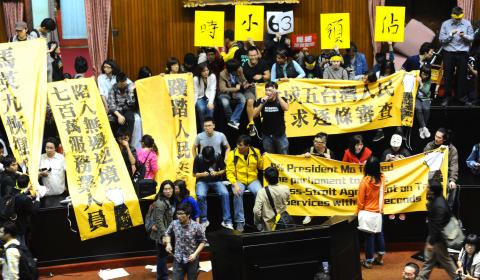
Photo: Chang Chia-ming, Taipei Times.
The protesters staged a sit-in in the assembly hall where lawmakers hold meetings, saying that they would stay there until Friday and until the KMT withdraw the agreement from the plenary.
The protesters called on supporters to bring supplies to the site.
The KMT caucus has breached a previously reached inter-party consensus that the pact — which experts said could severely affect local industries — must be reviewed clause-by-clause in the Legislative Yuan, which has infuriated the public, the opposition said, adding that the move amounted to contempt of parliament and a betrayal of democratic principles.
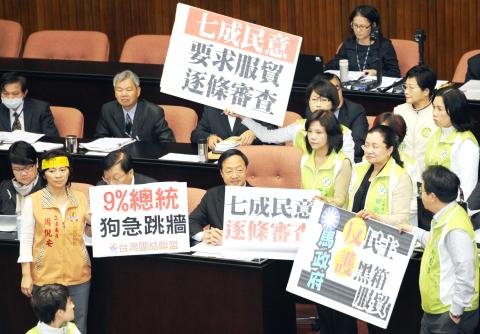
Photo: Lo Pei-der, Taipei Times
In response, the Democratic Progressive Party (DPP) and the Taiwan Solidarity Union (TSU) boycotted the Legislative Yuan’s plenary session yesterday, forcing Legislative Speaker Wang Jin-pyng (王金平) to announce an adjournment for party negotiations.
Opposition parties vowed to continue boycotting the plenary until the KMT retracts the agreement.
With President Ma Ying-jeou’s (馬英九) administration and the KMT showing no signs of retracting the agreement, DPP Chairman Su Tseng-chang (蘇貞昌) yesterday said the party would launch a series of “countermeasures” against the KMT over the next three days.
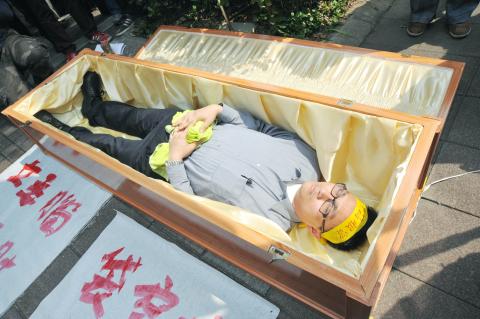
Photo: Mandy Cheng, AFP
The DPP said that it would propose a “better agreement” than the current service trade pact in its Central Standing Committee meeting today and convene a meeting with representatives from various industries and civic groups tomorrow to discuss the establishment of an alliance to monitor the review of the agreement.
In addition, the party plans to launch a campaign to “besiege” the Legislative Yuan.
“Our goal to review the pact clause-by-clause and to renegotiate the deal remains unchanged,” Su said.
The TSU is mobilizing its supporters and industry representatives to “besiege” the Legislative Yuan on Friday, with TSU Chairman Huang Kun-huei (黃昆輝) accusing the KMT of breaching the consensus, which Huang called unacceptable.
Speaking to reporters after the plenary session yesterday, Wang said that although the KMT’s handling of the review surprised him, he would not speculate on what the pan-blue and pan-green camps would do next week.
While another round of inter-party negotiation is needed, “the atmosphere is not appropriate for both camps to sit down and talk at this moment,” Wang said.
At separate press conferences, DPP caucus director-general Gao Jyh-peng (高志鵬) said that the party would continue boycotting plenary sessions until the KMT offers a concession, while DPP Deputy Secretary-General Lee Chun-yi (李俊毅) insisted that the agreement should stay in the committee and be reviewed line-by-line.
Former premier Frank Hsieh (謝長廷) of the DPP posted on Facebook that he supported an “all-out protest” in collaboration with the public against the KMT.
Dozens of civic group representatives and students, who have had been camping outside the Legislative Yuan since Monday, stepped up their mobilization efforts, urging the public to join the sit-in and an overnight rally to voice their opposition to what they called the KMT’s “brutal” decision that had completely ignored the interests of the Taiwanese.
DPP lawmakers Hsiao Bi-khim (蕭美琴), Wu Yi-chen (吳宜臻) and Wu Ping-jui (吳秉叡) also staged a 70-hour hunger strike, which began at noon yesterday and would last until 10am on Friday, when a plenary session is scheduled to commence.
The protest in front of the Legislative Yuan would continue until Friday, according to Lai Chung-chiang (賴中強), convener of the Democratic Front Against the Cross-strait Trade in Services Agreement and spokesperson of the rally.
Beginning yesterday morning, the police have reinforced deployment and have installed a road block around the Legislative Yuan compound to keep the protesters from entering the compound and to prepare for the planned siege on Friday.

‘CROWN JEWEL’: Washington ‘can delay and deter’ Chinese President Xi Jinping’s plans for Taiwan, but it is ‘a very delicate situation there,’ the secretary of state said US President Donald Trump is opposed to any change to Taiwan’s “status quo” by force or extortion and would maintain that policy, US Secretary of State Marco Rubio told the Hugh Hewitt Show host on Wednesday. The US’ policy is to maintain Taiwan’s “status quo” and to oppose any changes in the situation by force or extortion, Rubio said. Hewitt asked Rubio about the significance of Trump earlier this month speaking with Taiwan Semiconductor Manufacturing Co (台積電) chairman C.C. Wei (魏哲家) at the White House, a meeting that Hewitt described as a “big deal.” Asked whether the meeting was an indication of the

‘RELATIVELY STRONG LANGUAGE’: An expert said the state department has not softened its language on China and was ‘probably a little more Taiwan supportive’ China’s latest drills near Taiwan on Monday were “brazen and irresponsible threats,” a US Department of State spokesperson said on Tuesday, while reiterating Washington’s decades-long support of Taipei. “China cannot credibly claim to be a ‘force for stability in a turbulent world’ while issuing brazen and irresponsible threats toward Taiwan,” the unnamed spokesperson said in an e-mailed response to media queries. Washington’s enduring commitment to Taiwan will continue as it has for 45 years and the US “will continue to support Taiwan in the face of China’s military, economic, informational and diplomatic pressure campaign,” the e-mail said. “Alongside our international partners, we firmly
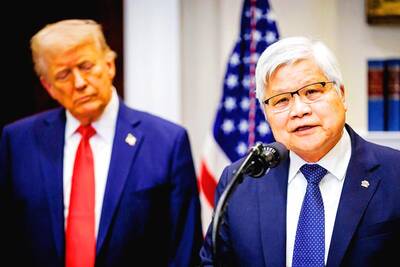
KAOHSIUNG CEREMONY: The contract chipmaker is planning to build 5 fabs in the southern city to gradually expand its 2-nanometer chip capacity Taiwan Semiconductor Manufacturing Co (TSMC, 台積電), the world’s biggest contract chipmaker, yesterday confirmed that it plans to hold a ceremony on March 31 to unveil a capacity expansion plan for its most advanced 2-nanometer chips in Kaohsiung, demonstrating its commitment to further investment at home. The ceremony is to be hosted by TSMC cochief operating officer Y.P. Chyn (秦永沛). It did not disclose whether Premier Cho Jung-tai (卓榮泰) and high-ranking government officials would attend the ceremony. More details are to be released next week, it said. The chipmaker’s latest move came after its announcement earlier this month of an additional US$100 billion
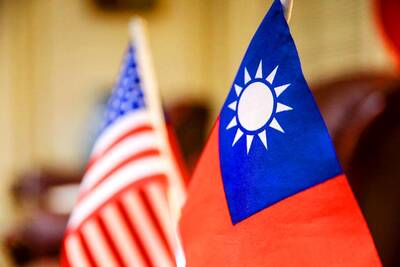
COUNTERING THE PLA: While the US should reinforce its relations with partners and allies, Taiwan must invest in strengthening its defenses as well, Phillip Davidson said If influence in the Indo-Pacific region is one of the US’ core interests, then Taiwan serves as a cornerstone of US economic and security influence in the region, former US Indo-Pacific Command commander admiral Phillip Davidson said on Thursday. “China’s ... strategy is to supplant the US leadership role in the international order ... and they’ve long said ... that they intend to do that by 2050,” Davidson told the National Review Institute’s Ideas Summit in Washington. Davidson said he had previously told US Senate hearings on China’s military activities and possible threats in the Indo-Pacific region that a Chinese invasion of